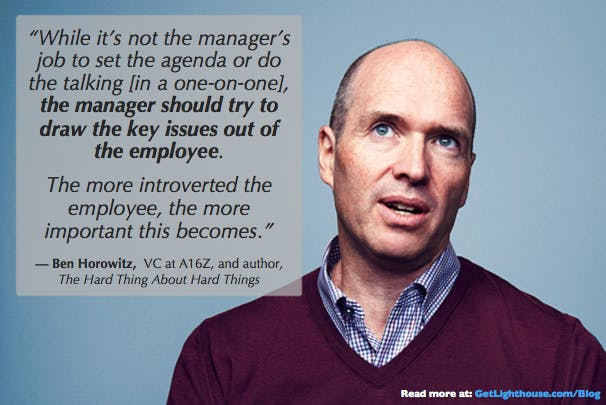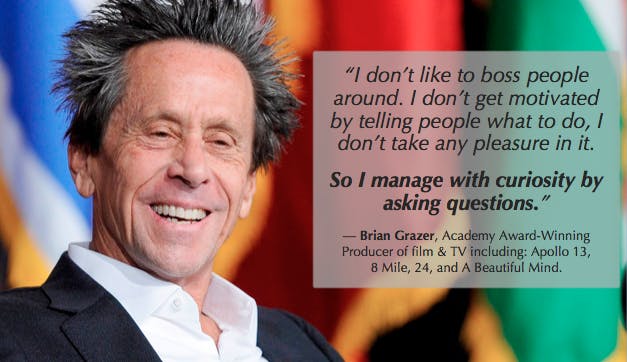What do you do simply for the fun of it? What do you do that others would consider work, but that you love doing anyways?
The first question often leads people to thinking of hobbies and things they do in their leisure.
The second question typically leads to people talking about an aspect of their work they *LOVE*.
For me, I could talk about building products and how to create little delights in products all day and night. The same could be said for leadership challenges; I find them to be fascinating puzzles that I love untangling.
When you're at a career or job for a long time, I think it's important to stop and reflect on: what are the parts of the job you LOVE? Then, it's important to check in how often you still do those things.
I find that when I'm getting drained and feeling unmotivated, part of it is how long it's been since I got to do the things I loved.
To be honest, since we shut down Lighthouse software in December, I've really missed the creative outlet of building software. Fortunately, I also love writing about leadership, which this newsletter is my favorite outlet for.
In today’s edition, we cover a secret approach dating back to the time of Socrates (and relayed through Dale Carnegie), share tactics for getting team members to open up, and revisit one of our most important, classic posts.
Let’s dive in…
Table of contents:
- 🥘 Food for Thought on The Secret of Socrates
- 💫 Lighthouse Tips & Tricks on Getting Team Members to Open Up.
Note: This is a preview of our weekly leadership newsletter, Lighthouse Leadership Weekly (LLW).
To get this sent to your inbox every week, along with our latest long form essays on this blog, you can sign up here.
➡️ Did a friend forward this to you? Get every issue straight to your inbox by signing up here.

🥘 Food for Thought
"In talking with people, don't begin by discussing the things which you differ. Begin by emphasizing - and keep on emphasizing, if possible, that you are both striving for the same end and that your only difference is one of method and not of purpose." - Dale Carnegie in How to Win Friends and Influence People
This timeless advice from Carnegie applies as much today as when he wrote it nearly 100 years ago.
When you are trying to persuade others, it can be tempting to jump straight to any sticking points; you want to win them over and get through things as fast as you can.
Yet, that isn't likely to win people over nearly as well as you think.
As Carnegie advises, you can build more positive momentum by starting with what you agree on.
It also makes the other person feel heard, and reminds both of you of the common ground that you have.
It becomes a lot easier to not get upset about a disagreement or a contentious point down the line when you already feel like you're in agreement on 5 other aspects.
It can also disarm your opponent if you're clever.
Agree on your weaknesses and shortcomings.
An advanced application of this tactic is to agree with your opponent on your weaknesses.
In the world of film, you see this in the movie, 8 Mile's epic, final rap battle where B. Rabbit (played by Eminem) talks about all the things his opponent would normally say about him in the battle. It leaves the other rapper speechless.
And in the workplace, you can use this, too.
It's incredibly disarming to acknowledge your weaknesses and issues to someone, whether in a tense negotiation, or a workplace dispute. The other side is often coming ready for a knock down, drag out fight over some issues, but if you open by acknowledging and agreeing to them, there's not much to fight over anymore.
That's when people often calm down quickly, and you can start working towards the resolution you want.
The Genius Recruiting Tactic of Kevin Yien:
I heard this tactic on display with a recent interview of product leader Kevin Yien, who was interviewed on Lenny Ratchitsky's podcast. In it, he described the "Unsell Email" which he uses to be transparent about the downsides of accepting a job offer from him:
Once I decide to extend an offer to someone, I send an email with ~10 bullet points that outline the gnarliest things they will discover about the role, company, and culture in their first 90 days on the job. Things that are difficult to get from the interview process.
— Kevin Yien (@kevinyien) January 28, 2022
This is genius, because it brings to the surface concerns potential new hires may explicitly have, as well as ones they felt, but couldn't put their finger on.
It also opens the door to having a frank, open conversation about them to see if they're deal breakers or not.
In many cases, this actually will help you close the candidate for a few reasons:
- Trust: If you're willing to share your warts and challenges, it shows you're a manager that can be trusted.
- Relief: Ever go through an interview and feel like the company is hiding things from you? This kind of message eliminates that concern.
- Contrast: If they have multiple offers, and all the others are making the hard sell, this approach can really make you stand out.
And best of all, if you know X is going to be a challenge from day 1, and both your potential new hire, and you, the hiring manager, are openly talking about it at the offer stage, you can do something about it.
Rather than it festering as a frustration while they're onboarding and trying to get their first wins, you can literally be doing your best to avoid or reduce the problem. That's masterful management, and can turn what would lead to an early departure into something tolerable to the point someone stays for years after.
Next time you're worried about a conflict point in hiring, a negotiation, or with a team member, consider acknowledging the issue, agreeing with the other side, and seeing how it can lead to better outcomes for everyone.
💫 Lighthouse Tips & Tricks on Getting Team Members to Open Up
A common issue I hear from managers is that they have this one team member they're struggling with. The person's work is often fine (or sometimes even great!), but they struggle to communicate with them.
This is the kind of person that gives you one word answers in your 1 on 1s, and rarely participates unless called on.
This can be really frustrating as a manager, especially if you're the Type A, extroverted type who wants to be a great manager for everyone, and struggles to understand why anyone wouldn't want to open up to you.
And while sometimes there are people who just are extremely introverted and/or private, there are things you can do that can often open people up.
And that's this week's Lighthouse Tips & Tricks.
How to get your quiet team members to open up
Now, before we get into specific tactics, I want to remind you that you have to let everyone be who they are. You cannot turn an introvert into an extrovert. You can't mandate they become chatty.
But if you try some of these approaches, you might just see them open up a bit more:

1) Ask work related questions first
I know. We talk a lot about how important it is to build rapport and get to know your team beyond their work. And in most cases, that's the best way to get started. As we talked about last week, learning the names of their family and pets are a great way to build a strong foundation for your relationship by showing you care.
Yet, some people don't want to share those things for any number of reasons (privacy, issues in their personal life, something unconventional, etc), which is totally reasonable.
And in those cases then the best move is to pivot to work related topics that may open them up a bit. Questions like these (from our list of over 150 1 on 1 questions) can do the trick:
- How many hours a day do you feel you're productive? How could we help you be more productive?
- What could I do to make you enjoy your work more?
- What have your past managers done that you'd like me to also do or not do?
- What's your favorite thing I do as a manager I should keep doing?
- What's one thing we'd be *crazy* not to do in the next quarter to improve our product?
- Who would you like to work more often with? Why?
- Is everyone pulling their weight on the team?
- When was the time you enjoyed working here the most?
- What's something you feel is undervalued that you contribute to the team?
- What part of your job do you wish you didn't have to do?
All of these questions are to try to get them talking. You'll notice none of them can really be answered Yes or No.
And when you get them talking a bit on these subjects, you'll learn something valuable to help you as a leader. If you then follow through on what you hear, you'll reinforce that it's worth opening up to you.

2) Look for signs of things to ask about
Sometimes it really is that easy. Look at them, and around them:
- What are they wearing? If the shirt has a logo, band, team, or anything like that, ask about it!
- What's around their desk? Whether it's a coffee mug with something interesting on it, a figurine, or a picture, those can be good conversation starters to ask about, too.
- What's in their Zoom background? Before the rise of artificial backgrounds, this was a bit easier, because you could notice books on a shelf behind them, plants, a poster, or simply the weather where they are. Now, even with a Zoom background, you can at least ask about why they chose the background they have if there's anything interesting about it.
The point here is to be attentive. Look for interesting or unique things and then show genuine interest in asking them what they are.
This won't always work, but when it does, the floodgates often open and they're excited to talk about the item for quite a while. Let them. Reinforce that you're interested and care about things they're excited and passionate about.

3) Thank them for what they do open up about
Once again, the fundamentals really matter here. When they finally open up to you, make sure you show your appreciation.
Now, you shouldn't pander to them, or be patronizing, but you can:
- Immediately thank them for sharing.
- Make a commitment to follow through on anything they shared that's actionable.
- Actually note it and then really follow through (often writing it down in front of them makes a good impression!)
- Close the loop next time to let them know what happened because of what they shared (if relevant), or ask a bit more about it in a future 1 on 1 to show you remembered and care.
These may seem simple, but how often do you do all 4 of these things? Without making a real, conscious effort, most managers only manage to do half of those things.
In the case of a tough to reach team member, this is critical. You're just starting to get them to open up, so you may only get one chance to build trust with them. Don't waste it!

4) Send questions in advance, so they aren't put on the spot
One of the most important things to learn as a leader is that we're not all the same. What one person responds to won't always work for everyone else.
And one of the most prominent places this comes into play is in the case of introverts vs. extroverts.
While extroverts love to meet in groups, can think on their feet, and are happy to contribute in meetings, introverts often take a different approach.
Introverts tend to be more thoughtful and introspective. They need time to reflect, digest, and observe. They're often not a big fan of the spotlight and don't want to be called on out of the blue.
Yet, it's really easy as a manager to assume everyone wants treated like an extrovert.
And in most cases, that team member who is hard to open up is an introvert.
To work on this, there are two simple things you can do:
- Use your 1 on 1s as the place to get them to open up more: A private, 2 person meeting reduces the spotlight effect that can otherwise make them not want to share much.
- Send them your questions and topics in advance: By telling them ahead of time what you want to talk about (whether general topics like "Your career growth" or a couple of the questions from point 1), you give them a chance to really think about them and prepare a good response.
It only takes you 2 minutes to send them a few notes ahead of time (ideally the day before, or at least 4-5 hours before your 1 on 1 with them), but can really make a big difference on the quality of the responses you receive.

5) Tackle the elephant in the room.
This last one should be saved as a last resort, but it can sometimes work to break through when nothing else seems to.
By talking the issue head on, you may just get them to open the floodgates.
Sometimes, the reason someone isn't opening up is YOU.
Yes, that's right, they have a personal issue with you, so they're not engaging in defiance of, or in protest of you.
I'm not here to judge whether they're right or wrong, and frankly, you shouldn't either. Your goal here is simply to understand why they feel that way.
To do this, follow these steps:
- Ask directly: Say something like, "I've noticed you don't seem to participate often in meetings and seem to not like when I ask you questions. Was there something I've done to upset you? What part of my management style bothers you?"
- Really listen: This is so important. Many people ask a question and then start thinking of what they want to ask next. Instead, pay attention to what they say. Ask followup and clarifying questions. Practice active listening.
- Don't be defensive: No matter how much what they say hurts, or seems wrong, resist the temptation to fire back or disagree. Just listen and learn why they feel that way.
- Ask for their suggestions: Even if they're making accusations you think are unreasonable, one way to win them over is to ask them for suggestions on how to address the issue. Sometimes, you'll get something practical and reasonable you can really do. Other times, they may realize that it would be very difficult for you to change what's bothering them. Either way, you're getting them thinking about a different, better future and how to get there.
- Thank them: Even if you disagree with everything they said and all of their suggestions, you just got them to open up. Be grateful they did and that you understand their perspective better. Then, it's up to you to digest what they said and determine any changes you want to make (which frankly may include seeing if transferring them to another team makes sense).
----
Getting your team members to open up can be a challenge at times, but trying these tactics can help you break through.
While it requires a bit of extra thought and effort, the results are totally worth it; when you get that quiet team member to start to engage more, you often unlock great, new ideas, and see an improvement in their work.
How do you get your team members to open up?
Sign up to get this newsletter & our latest blog posts straight to your inbox:




